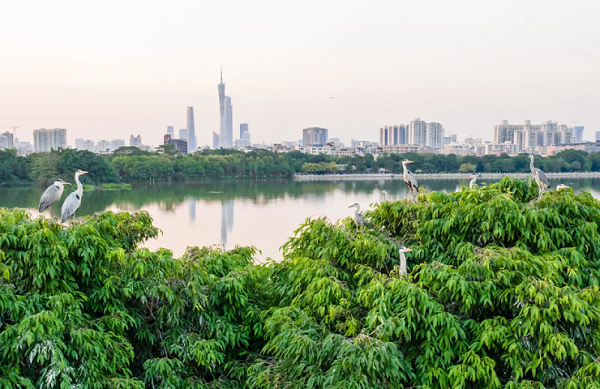More rare wild birds camp in Haizhu Wetland

The aerial view of the Haizhu Wetland.
After years of ecological protection and restoration, Haizhu Wetland now features clear waters and abundant birds with more and more rare wild birds camping here. Recently, researchers discovered two new bird species—the rose-ringed parakeet and the collared finchbill. This brings the total bird species recorded at Haizhu Wetland to 200. The rose-ringed parakeet is notably beautiful and has the intelligence level of a four-year-old human.
The rose-ringed parakeet often tries to mimic human sounds in its environment and can learn vocabulary by listening to music. It is listed as a second-level protected species in the List of National Key Protected Wild Animals. Historically, its distribution was broad, living in tropical and subtropical regions, with Guangzhou being the northernmost location.
The rose-ringed parakeet found in South China was introduced from outside around 1900 and gradually established a sizable wild population. It was once widely distributed in the south of the Pearl River in Guangdong, and was commonly seen flying over the Pearl River Delta. However, there have been no records in the wild in Guangzhou since 1980.
The rich habitat of Duoji fruit forests in Haizhu Wetland, with its diverse resources, provides ample food and shelter for the rose-ringed parakeet. Initially, 20 parakeets were reintroduced to the wild, and now a stable population of these parakeets can be observed in the wetland.
The collared finchbill typically inhabits forests and bamboo groves but can also be found near farmland and villages. Its calls are clear and melodious, and the bird is most active during the early morning and dusk. The breeding season for them usually occurs in spring. They build nests in trees and lay 2 to 4 eggs, which are incubated by the female.
As the largest and most well-preserved ecological core among the world's major urban centers, Haizhu Wetland boasts exceptional resources in ecology, research, culture, and location. Over time, its ecological value has become increasingly apparent, including its roles in environmental protection, scientific research, education, and recreation. More residents and visitors are enjoying its green benefits. The wetland's efforts to reintroduce rare bird species are effectively restoring local wildlife diversity in Guangzhou, enhancing ecosystem stability, and providing valuable experience and techniques for the recovery of other native wildlife.
All rights reserved. Presented by China Daily

